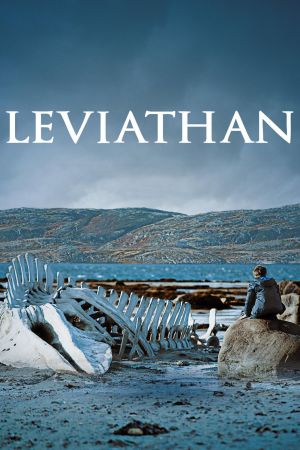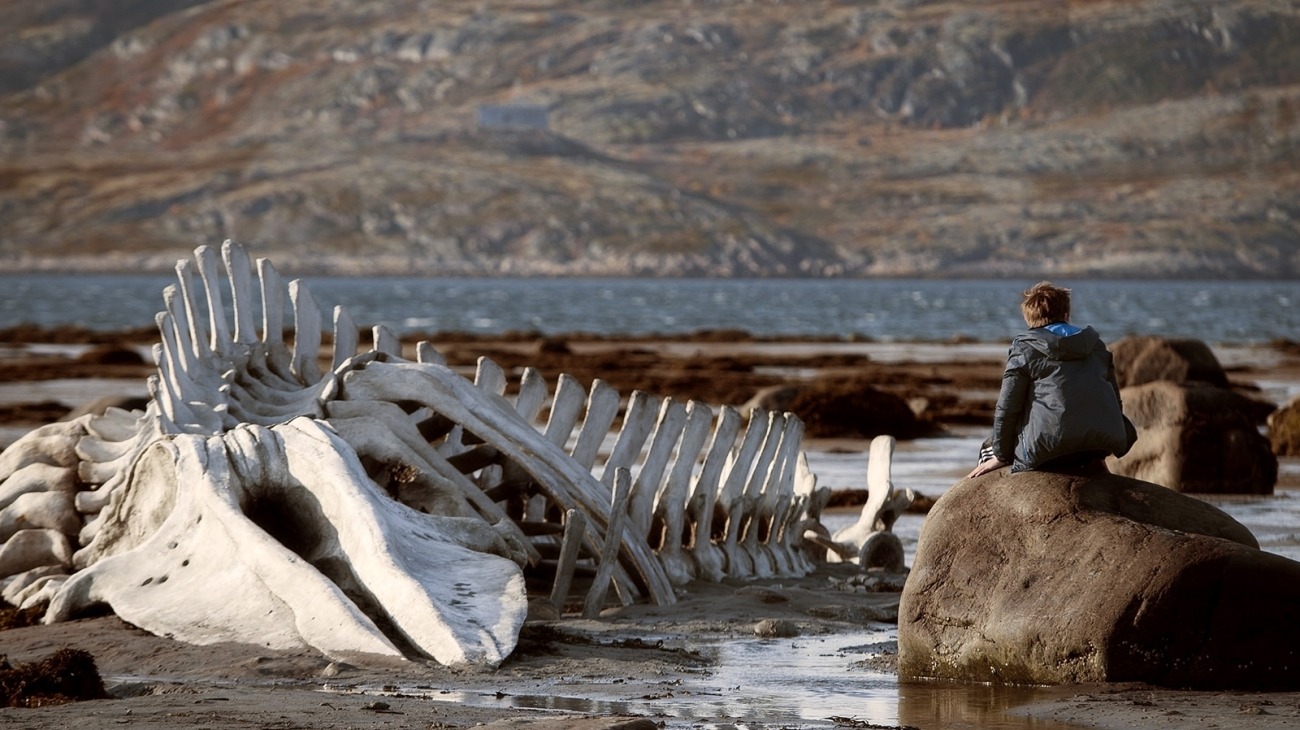
Putin up with all this nonsense
I don't know where the line is drawn between a story that has metaphorical aspects to it, and metaphor that is happens to take the form of a narrative, but I know that Leviathan is way the hell on the far side of it. To say that it is about corruption and cronyism in the Russian government under Vladimir Putin is on the same level as saying that it's a sound film in color. And its satiric intent is carried through on the back of the drama of one man's life that one could, I suppose, find interesting and enjoyable to watch on its own merits, but it must take a great deal of effort to divorce from its frenzied, viscerally angry political undercurrent. Certainly by the time it gets to the scene where Mistreated and Ignored Young Generation (Sergey Pokhodaev) has run away from his father, Middle-Class Striving to Find Economic Dignity (Aleksey Serebryakov) and his step-mother, Opportunistic Attempt to Exploit the Middle-Class's Desire to Rebuilt (Elena Lyadova), in order to weep in front of the Denuded Bones of the Old System that Beached Itself and Died, you'd have the be the most stringent literalist in the world not to be a bit whammied by the symbolism.
So it's not as schematic as that, though certainly, any film called Leviathan that features a scene of an adolescent crying next to the bones of a long-dead whale, when those bones have not previously figured into the film in any way whatsoever, that is a film that's a little a little bit schematic (so to is the moment when a priest reads from the passage in the Bible naming Leviathan - a passage from the Book of Job, that favorite of metaphorists everywhere). That being said, Leviathan is still a pretty great work of cinematic storytelling, with a particularly Russian affection for grandiosity and probing hopelessness. The actual plot centers on Kolya (Serebryakov), the owner of a small patch of land which has been claimed by the municipal government, attached to a much-too-small payoff. Doggedly attempting to work through the system to retain what's his, Kolya and his lawyer Dmitriy (Vladimir Vdovichenkov) are steamrolled by the local courts in one of the earliest scenes, and from here, they fence hopelessly with the boundlessly corrupt mayor (Roman Madyanov), while Kolya is busily trying to put out the domestic fires of a contemptuous, rebelling son, Roma (Pokhadaev), and an increasingly disinterested wife, Lilya (Lyadova). So disinterest that she's having an affair with Dmitriy, in fact.
It's a pretty simple parable about the impossibility of fighting the system when the system can bury you in bureaucracy, then intimidation, then actual violence; Kafka's The Trial with the stakes shifted to land ownership and presented with burly Russian realism that would happily fit in with the narratives of that country's great novelists of the 19th Century. A comparison that maybe starts to explain how such a simple fable could end up clocking in at 140 powerfully ponderous minutes - Leviathan is a good title for just all sorts of reasons, really. Writers Andrey Zvyagintsev (also directing) and Oleg Negin do not hold back on cramming all kinds of life and problems into their movie,. After indicting governmental bureaucracy, along with the Orthodox Church, and the basic greediness of humans, Leviathan still leaves time to focus its attention on the ways that people live and entertain themselves, finding meaning where they can even as life conspires to crush them. Literary sprawl rarely translates to cinema with such impressive cinematic presence and captivating humans; it's turning into a pretty reliable truck for Zvyagintsev, though, whose work as director has been consistently that. Leviathan is in some ways a step back: it's not as radically different as his first, best film, The Return, and as a domestic drama with politically symbolic overtones, it's neither as insightful nor graceful as Elena. But taken on its own terms, it's rumbling and impressively solemn and heavy with the weight of its grey skies and cloudy landscapes, a gorgeous marriage of landscape, narrative, and tone to create an overall sense of implacable fatalism in even as simple a thing as a drunken picnic.
It's all profoundly depressing, sure, though threaded with just enough of a sense of mordant humor (something almost totally absent from The Return or Elena - I haven't seen Zvyagintsev's second feature, The Banishment, but I have my suspicion that it would be about the same) to keep it from being an unpleasant slog. And the film's sudden and repeated shifts in the second half are slithery enough that the film transforms into quite a sharp little thriller, on top of everything else it has going on. There's a level of absolute confidence on display that's tremendously energising to watch, for such a long, slow, grim affair; it's a movie sure of its social ideas, sure of its visual motifs, sure of its echoing sound mix, and sure of its tightly controlled tone. The actors are uniformly outstanding, bringing particularity and personality to even the most oddly-conceived parts (there are characters with enormous swatches of screentime who simply don't seem to do anything), and helping not only to flesh out the film's world, but also to temper its novelistic severity with warmth and that same mordant humor; the way that the cast times their reaction throughout the movie almost suggests that the whole thing is a comedy which just happens to lack jokes.
It ends up feeling a bit oppressive, sure, and far more cynically hopeless than most movies would dare to be ("let me tell you about a situation you already recognise, which neither you nor I can change" - not exactly the stuff of rousing political commentary), and for these reasons its hard to claim for it the masterpiece status that has been tremulously hovering around it ever since its 2014 premiere in competition at Cannes. It doesn't do anything new: and other than some surprising plot developments late in the game which seem to vaguely want to raise some ambiguities that really aren't ambiguous at all, the film you expect it to be by the one-fifth mark is pretty much exactly the film it proves to be. But it's a stellar execution of that movie, and if it represents a dip in Zvyagintsev's career progression, it's an awfully minor one.
8/10
So it's not as schematic as that, though certainly, any film called Leviathan that features a scene of an adolescent crying next to the bones of a long-dead whale, when those bones have not previously figured into the film in any way whatsoever, that is a film that's a little a little bit schematic (so to is the moment when a priest reads from the passage in the Bible naming Leviathan - a passage from the Book of Job, that favorite of metaphorists everywhere). That being said, Leviathan is still a pretty great work of cinematic storytelling, with a particularly Russian affection for grandiosity and probing hopelessness. The actual plot centers on Kolya (Serebryakov), the owner of a small patch of land which has been claimed by the municipal government, attached to a much-too-small payoff. Doggedly attempting to work through the system to retain what's his, Kolya and his lawyer Dmitriy (Vladimir Vdovichenkov) are steamrolled by the local courts in one of the earliest scenes, and from here, they fence hopelessly with the boundlessly corrupt mayor (Roman Madyanov), while Kolya is busily trying to put out the domestic fires of a contemptuous, rebelling son, Roma (Pokhadaev), and an increasingly disinterested wife, Lilya (Lyadova). So disinterest that she's having an affair with Dmitriy, in fact.
It's a pretty simple parable about the impossibility of fighting the system when the system can bury you in bureaucracy, then intimidation, then actual violence; Kafka's The Trial with the stakes shifted to land ownership and presented with burly Russian realism that would happily fit in with the narratives of that country's great novelists of the 19th Century. A comparison that maybe starts to explain how such a simple fable could end up clocking in at 140 powerfully ponderous minutes - Leviathan is a good title for just all sorts of reasons, really. Writers Andrey Zvyagintsev (also directing) and Oleg Negin do not hold back on cramming all kinds of life and problems into their movie,. After indicting governmental bureaucracy, along with the Orthodox Church, and the basic greediness of humans, Leviathan still leaves time to focus its attention on the ways that people live and entertain themselves, finding meaning where they can even as life conspires to crush them. Literary sprawl rarely translates to cinema with such impressive cinematic presence and captivating humans; it's turning into a pretty reliable truck for Zvyagintsev, though, whose work as director has been consistently that. Leviathan is in some ways a step back: it's not as radically different as his first, best film, The Return, and as a domestic drama with politically symbolic overtones, it's neither as insightful nor graceful as Elena. But taken on its own terms, it's rumbling and impressively solemn and heavy with the weight of its grey skies and cloudy landscapes, a gorgeous marriage of landscape, narrative, and tone to create an overall sense of implacable fatalism in even as simple a thing as a drunken picnic.
It's all profoundly depressing, sure, though threaded with just enough of a sense of mordant humor (something almost totally absent from The Return or Elena - I haven't seen Zvyagintsev's second feature, The Banishment, but I have my suspicion that it would be about the same) to keep it from being an unpleasant slog. And the film's sudden and repeated shifts in the second half are slithery enough that the film transforms into quite a sharp little thriller, on top of everything else it has going on. There's a level of absolute confidence on display that's tremendously energising to watch, for such a long, slow, grim affair; it's a movie sure of its social ideas, sure of its visual motifs, sure of its echoing sound mix, and sure of its tightly controlled tone. The actors are uniformly outstanding, bringing particularity and personality to even the most oddly-conceived parts (there are characters with enormous swatches of screentime who simply don't seem to do anything), and helping not only to flesh out the film's world, but also to temper its novelistic severity with warmth and that same mordant humor; the way that the cast times their reaction throughout the movie almost suggests that the whole thing is a comedy which just happens to lack jokes.
It ends up feeling a bit oppressive, sure, and far more cynically hopeless than most movies would dare to be ("let me tell you about a situation you already recognise, which neither you nor I can change" - not exactly the stuff of rousing political commentary), and for these reasons its hard to claim for it the masterpiece status that has been tremulously hovering around it ever since its 2014 premiere in competition at Cannes. It doesn't do anything new: and other than some surprising plot developments late in the game which seem to vaguely want to raise some ambiguities that really aren't ambiguous at all, the film you expect it to be by the one-fifth mark is pretty much exactly the film it proves to be. But it's a stellar execution of that movie, and if it represents a dip in Zvyagintsev's career progression, it's an awfully minor one.
8/10






